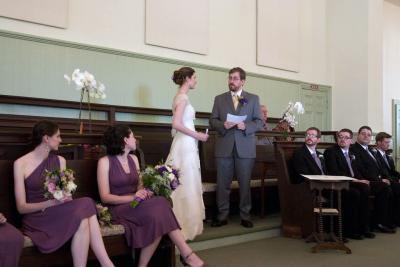
Marriage is a sacred commitment of two people to love one another in faithful partnership, with the expectation that the relationship will mature and be mutually enriching. Friends know that marriage depends on the inner experiences of the couple who marry and not on any external service or words. Thus, the ceremony in which the couple enter into this commitment is preformed by the couple alone, in the presence of God, the families, and the worshiping community. Both the solemnity and the joy of the occasion are enhanced by its simplicity.
The Meeting extends its loving care through its oversight of clearness for the couple and, upon approval of the Meeting, through careful attention to a Meeting for Worship for Marriage. In addition, care is given to assure that any applicable legal requirements are addressed.
The Clearness Process
The term clearness referred originally to clearness from other marriage commitments. Today, within a broader sense of clearness, a Clearness Committee consisting of Meeting members explores areas of understanding with the couple, considering what it takes to achieve the permanence and satisfaction of a committed, loving relationship, and the extent to which the couple is prepared for the dedication and constancy such a relationship requires.
The purpose of clearness is well served when members of the Committee ask thoughtful questions and listen attentively, leaving space for worship in the exchange. The Committee can be guided by these suggested queries for the couple:
- How did the couple meet? What values and beliefs do they hold in common? On what matters do they differ? Can they meet differences with humor and respect? Are they open to considering outside help if such guidance seems warranted?
- Do they both see marriage as sacred? Are they open to seeking divine assistance? What are their plans for nurturing the spiritual basis for their marriage?
- Do they each see themselves and their partner as equal and trusted, sharing responsibilities and decisions? Do they communicate feelings, needs, dreams, and fears?
- Are they aware of the need for other friendships that contribute to both individual growth and the marriage relationship?
- Have they thought about children, and the joys and the challenges families created, including consideration of how the work is shared?
- If there are children in either relationship to consider, has the couple broached the subject of this change of relationship with them?
- How do they view their relationships to their extended families? to their community: to society as a whole?
- Are there prior obligations – legal or financial or other – that need to be met?
The above are excerpts from the book Faith and Practice, published by the Philadelphia Yearly Meeting.
Swarthmore Friends Meeting is a welcoming and affirming community and we have had a longstanding committment to marriage equality. Learn more